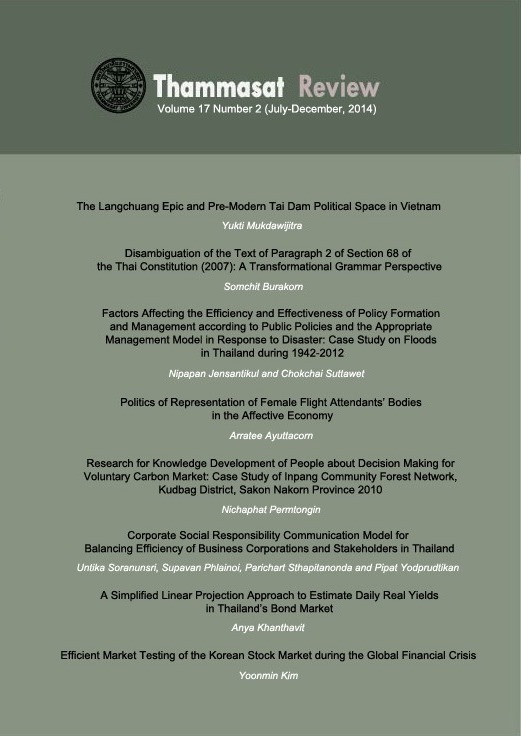Factors Affecting the Efficiency and Effectiveness of Policy Formation and Management according to Public Policies and the Appropriate Management Model in Response to Disaster: Case Study on Floods in Thailand during 1942-2012
Abstract
The objectives of this study on were to analyze factors affecting the efficiency and effectiveness of the policy formation and to study the implementation of public policies related to risk reduction and management of disaster. This qualitative research consisted of analysis of documents on floods that occurred in Thailand from 1942 to 2012 and interviews of stakeholders in policy formation and policy implementation who had experience in disaster management from related government and private sectors such as the Ministry of Interior, Department of Disaster Prevention and Mitigation, Royal Irrigation Department, Thai Meteorological Department, Bangkok Metropolitan Administration, including experts on disaster management, representatives from the communities and non-governmental organizations (NGOs). There were 18 key informants in total. The instruments used for collecting data on the qualitative research are recording forms and the semi-structured interview.
The study found that:
1. There were three main factors affecting the policy change, which consisted of technical factors, human performance and organizational performance.
2. The three laws directly related to disaster management (Civil Defense Act 1979, National Civil Defense Plan 2005 and Disaster Prevention and Mitigation Act 2007). The Civil Defense Act 1979 authorized the central government unit to be in charge of all disaster management. The National Civil Defense Plan 2005 was implemented under the Civil Defense Act 1979, while the Disaster Prevention and Mitigation Act 2007 authorized several units at different levels.
3. In this particular case study, the researchers have categorized into three subordinate case studies. From case studies between 1995 and 2006, the response towards disasters during this period was more defensive inclined than offensive, often focused on addressing immediate problems, as well as using infrastructure, such as dams, dikes, reservoirs and ridges to take in water and protect economic areas. As for the people, in 2006 there was clearer management of aids in communities. In 2011, the management of government still has a commanding characteristic, but there were changes in thinking – not only defensive, but preventive and preparative as well.
Keywords: Efficiency and Effectiveness, Policy Formation, Management
Downloads
Published
How to Cite
Issue
Section
License
The opinions and ideas expressed in all submissions published in Thammasat Review are solely that of the author(s) and do not necessarily reflect that of the editors or the editorial board.
The copyright of all articles including all written content and illustrations belong to Thammasat Review. Any individuals or organisation wishing to publish, reproduce and distribute a particular manuscript must seek permission from the journal first.








